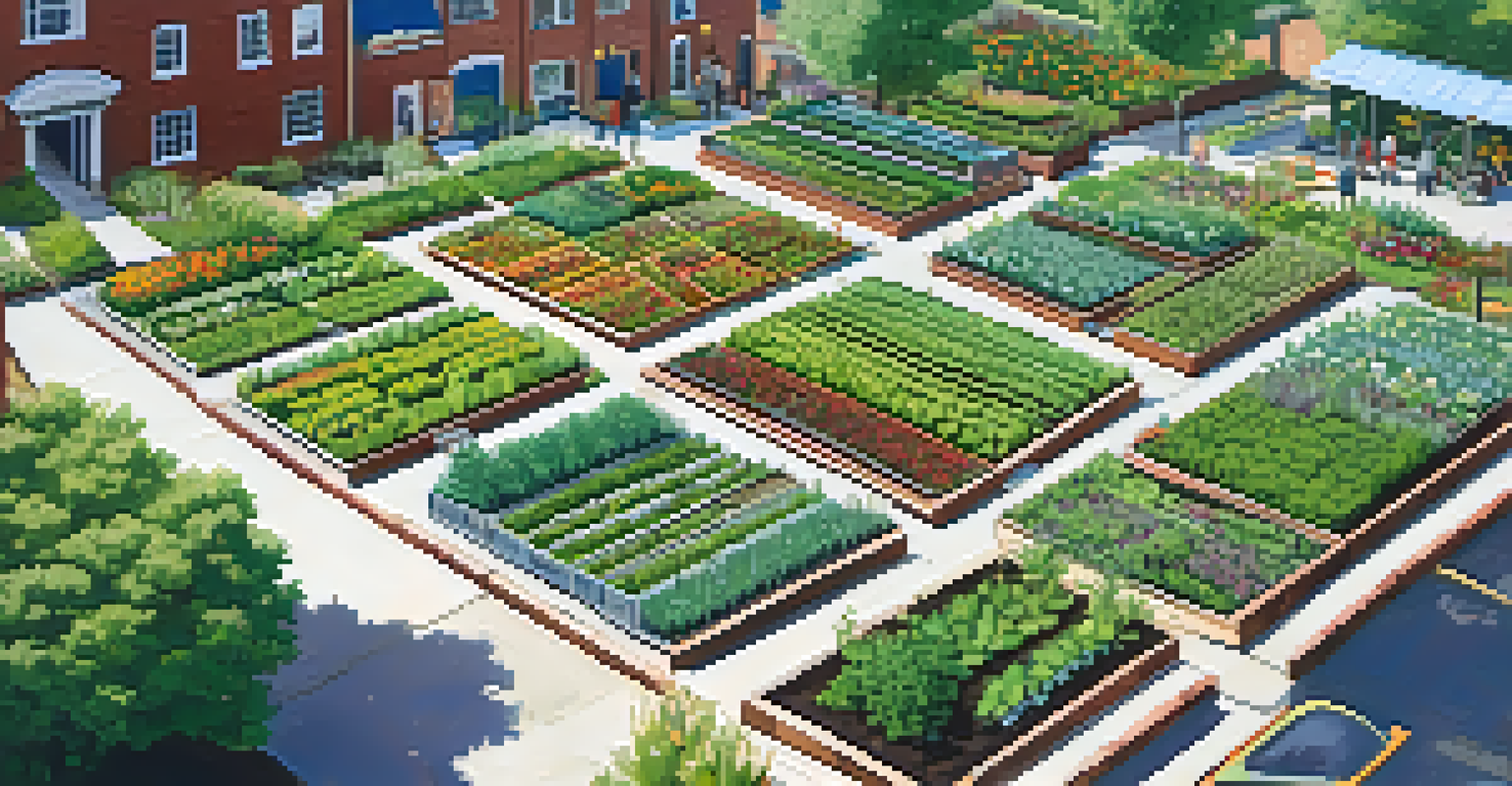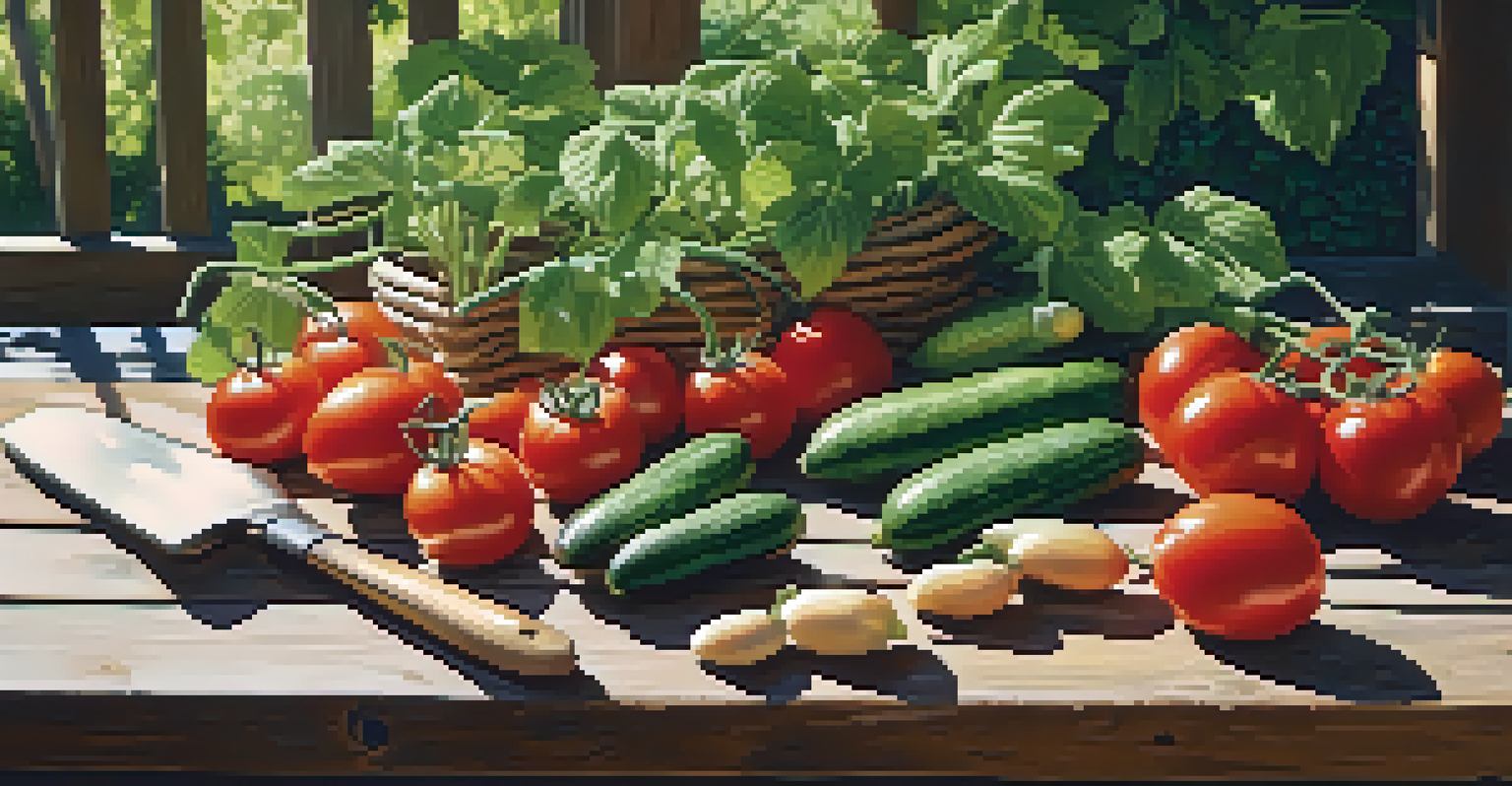Essential Tools for Your Community Gardening Projects

The Importance of Basic Gardening Tools
When starting a community gardening project, having the right basic tools is crucial. These tools form the backbone of your gardening efforts, making tasks easier and more efficient. Think of them as the foundation upon which your gardening success is built, allowing everyone to contribute meaningfully.
To plant a garden is to believe in tomorrow.
Common basic tools include hand trowels, pruners, and gloves. Each tool plays a specific role; for instance, a hand trowel helps with digging and planting, while pruners are essential for maintaining healthy plants. Investing in quality tools can save time and energy, making your gardening experience more enjoyable.
Don't forget to involve your community in selecting tools! This not only fosters a sense of ownership but also ensures that everyone has a say in what’s needed for the garden. Plus, discussing tool choices can spark conversations about different gardening techniques and preferences.
Investing in Quality Soil and Amendments
Healthy soil is the heart of any successful garden, and investing in quality soil and amendments is vital. Think of soil as the lifeblood of your plants, providing them with the nutrients they need to thrive. Without good soil, your plants may struggle to grow and produce a bountiful harvest.

Consider adding organic compost to enrich your soil. Compost not only improves soil structure but also enhances its fertility, encouraging beneficial microorganisms to flourish. This can be an exciting project for your community, as members can contribute kitchen scraps and yard waste to create rich compost together.
Essential Tools for Garden Success
Having the right basic gardening tools is crucial for efficiency and community involvement.
Moreover, testing your soil's pH and nutrient levels can guide you in making informed amendments. Local agricultural extension services often offer free or low-cost soil testing. Understanding your soil allows you to tailor your amendments, ensuring your garden receives exactly what it needs to flourish.
Essential Tools for Planting Seeds
Planting seeds is one of the most rewarding aspects of gardening, and having the right tools makes it even more enjoyable. Seed trays, dibbers, and planting guides can help streamline the process, ensuring that seeds are sown at the right depth and spacing. It’s like laying the groundwork for a beautiful future garden.
Gardening adds years to your life and life to your years.
Seed trays are especially useful for starting plants indoors or in a controlled environment. They allow you to monitor growth closely and offer a safe space for young plants before transferring them outdoors. Plus, it can be a fun group activity to organize seed-starting workshops within your community.
Don’t overlook the importance of labeling your seeds! Simple plant markers can help everyone in your community remember what’s planted where. This not only aids in identification but also helps track growth and care needs, fostering a collaborative gardening environment.
Tools for Maintaining Plant Health
Keeping plants healthy involves regular maintenance, and the right tools can make all the difference. Items like watering cans, garden hoses, and fertilizer spreaders are essential for ensuring your plants receive proper hydration and nutrients. Think of these tools as the caretakers of your garden, nurturing growth and vitality.
Watering cans are particularly handy for targeted watering, while hoses can cover larger areas more efficiently. It’s important to consider your garden layout when selecting watering tools, as this can affect both plant health and water conservation efforts. A well-planned watering system can greatly reduce waste.
Invest in Quality Soil for Growth
Healthy soil enriched with amendments is vital for thriving plants and a bountiful harvest.
Fertilizer spreaders can also ensure that nutrients are evenly distributed across your garden. They make the application process quick and consistent, reducing the risk of over-fertilization. Engaging the community in discussions about organic versus synthetic fertilizers can lead to valuable insights and shared best practices.
Harvesting Tools for Your Bounty
When it comes time to reap the rewards of your hard work, having the right harvesting tools is essential. Tools such as garden scissors, baskets, and gloves are perfect for gathering and handling your produce. Just like you wouldn’t use a spoon to cut a steak, having the right tool makes the process smoother and more enjoyable.
Garden scissors are great for snipping herbs and delicate vegetables, while baskets provide an easy way to collect and transport your harvest. This is also a perfect opportunity to involve the community, as everyone can contribute to the harvest and share in the excitement of gathering fresh produce together.
Additionally, consider setting up a communal harvest day. This not only brings everyone together but also creates a festive atmosphere around the harvest. Sharing recipes and cooking tips with the bounty can further enhance the sense of community and encourage ongoing participation.
Safety Equipment for a Worry-Free Experience
Safety should never be overlooked in any gardening project, and having the right safety equipment is crucial. Items like gloves, knee pads, and sun hats can protect you from injuries and make gardening a more comfortable experience. It’s important to prioritize safety so that everyone can enjoy gardening without worry.
Gloves are essential for protecting your hands from thorns, splinters, and dirt. A good pair can make a world of difference, allowing you to dig and prune without fear. Knee pads are also invaluable for those who spend a lot of time working at ground level, making the task gentler on your joints.
Community Collaboration Enhances Gardening
Sharing tools and incorporating technology fosters collaboration and strengthens community bonds.
Moreover, don’t forget about sun protection! Hats and sunscreen can help prevent sunburn during long hours in the garden. Encouraging discussions about safety practices in your community can create a culture of care and responsibility, ensuring everyone feels secure while working together.
Community Tools: Sharing is Caring
One of the beautiful aspects of community gardening is the spirit of sharing, and this extends to tools as well. Establishing a tool-sharing system can enhance collaboration and reduce costs for everyone involved. It’s like creating a mini-library, but for gardening tools, where everyone can borrow what they need.
Create a simple inventory of tools that community members can borrow, and encourage responsible usage. This not only builds trust among members but also fosters a sense of community ownership. Plus, sharing tools can spark conversations about gardening techniques and personal experiences.

Organizing workshops on tool maintenance can also be a great way to promote sharing. Teaching community members how to care for tools ensures longevity and sets a precedent for shared responsibility. In the end, sharing tools strengthens bonds and contributes to a more connected gardening community.
Incorporating Technology in Gardening
As we move into a more digital age, incorporating technology into community gardening can enhance the experience. Tools such as garden planning apps, moisture sensors, and online forums can provide valuable resources and support for gardeners. Think of technology as your gardening assistant, ready to offer advice and tips at your fingertips.
Garden planning apps can help you organize your layout and track what you’ve planted, while moisture sensors can alert you when your plants need watering. This tech-savvy approach is especially helpful for new gardeners, as it offers guidance and reassurance throughout the growing process.
Creating an online community, perhaps through social media or a dedicated forum, can also facilitate knowledge sharing and support. Members can exchange tips, share photos of their progress, and even organize events. Embracing technology can transform your gardening project into a vibrant, interactive community experience.